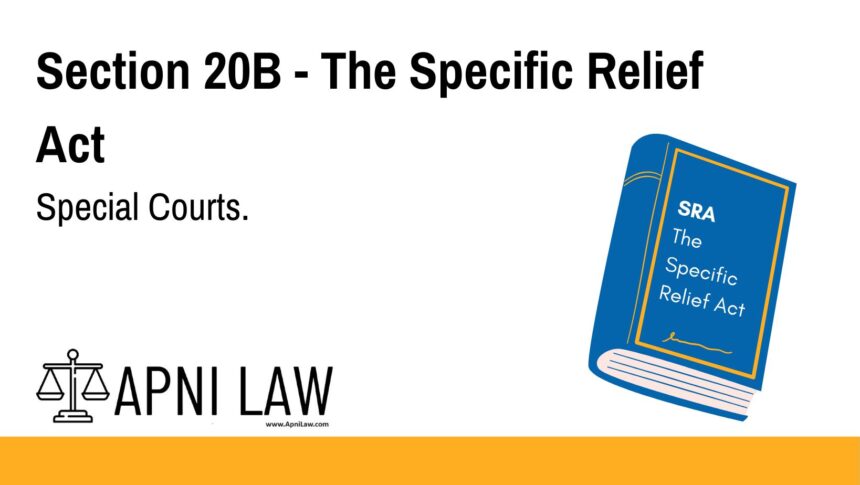Code: Section 20B Specific Relief Act
20B. Special Courts
The State Government, in consultation with the Chief Justice of the High Court, will designate, by notification in the Official Gazette, one or more Civil Courts as Special Courts. These courts will have jurisdiction to try suits related to contracts involving infrastructure projects.
Explanation of Section 20B Specific Relief Act
Section 20B establishes Special Courts specifically for handling cases that involve infrastructure projects. It ensures these cases are dealt with efficiently and by courts that specialize in such disputes.
Key Provisions:
- Designation of Special Courts: The State Government designates one or more Civil Courts to become Special Courts. These courts focus on infrastructure project-related contracts.
- Consultation with the Chief Justice: Before designating these courts, the State Government must consult with the Chief Justice of the High Court to ensure proper legal oversight.
- Jurisdiction: Special Courts will have jurisdiction over suits concerning infrastructure contracts. This helps to streamline the legal process for these important cases.
Illustration
Example 1: Setting Up Special Courts
In a state with multiple infrastructure projects, the State Government and Chief Justice may decide to designate a Special Court. This court will handle all legal disputes related to infrastructure contracts in that region.
Example 2: Dispute Handling in a Special Court
A company contracts to build a bridge, but a dispute arises over contract terms. Under Section 20B, a Special Court will resolve the issue. This court has the authority and expertise to handle such matters quickly and efficiently.
Common Questions and Answers on Section 20B Specific Relief Act
1. Why are Special Courts necessary under Section 20B?
- Answer: Special Courts help speed up the resolution of legal disputes related to infrastructure projects. They ensure that such important cases are managed by experts in the field, preventing delays in key projects.
2. Who decides which courts are designated as Special Courts?
- Answer: The State Government works with the Chief Justice of the High Court to designate the Special Courts.
3. Can any infrastructure project be assigned to a Special Court?
- Answer: Yes, any legal dispute concerning a contract related to infrastructure projects will be handled by these courts.
4. How does a Special Court’s jurisdiction work?
- Answer: Special Courts handle cases within the local limits specified by the government. This ensures that the appropriate court hears the case.
Conclusion
Section 20B ensures that legal issues regarding infrastructure projects are handled quickly. It does so by setting up Special Courts dedicated to these cases. These courts help prevent delays and ensure that infrastructure development proceeds smoothly.








